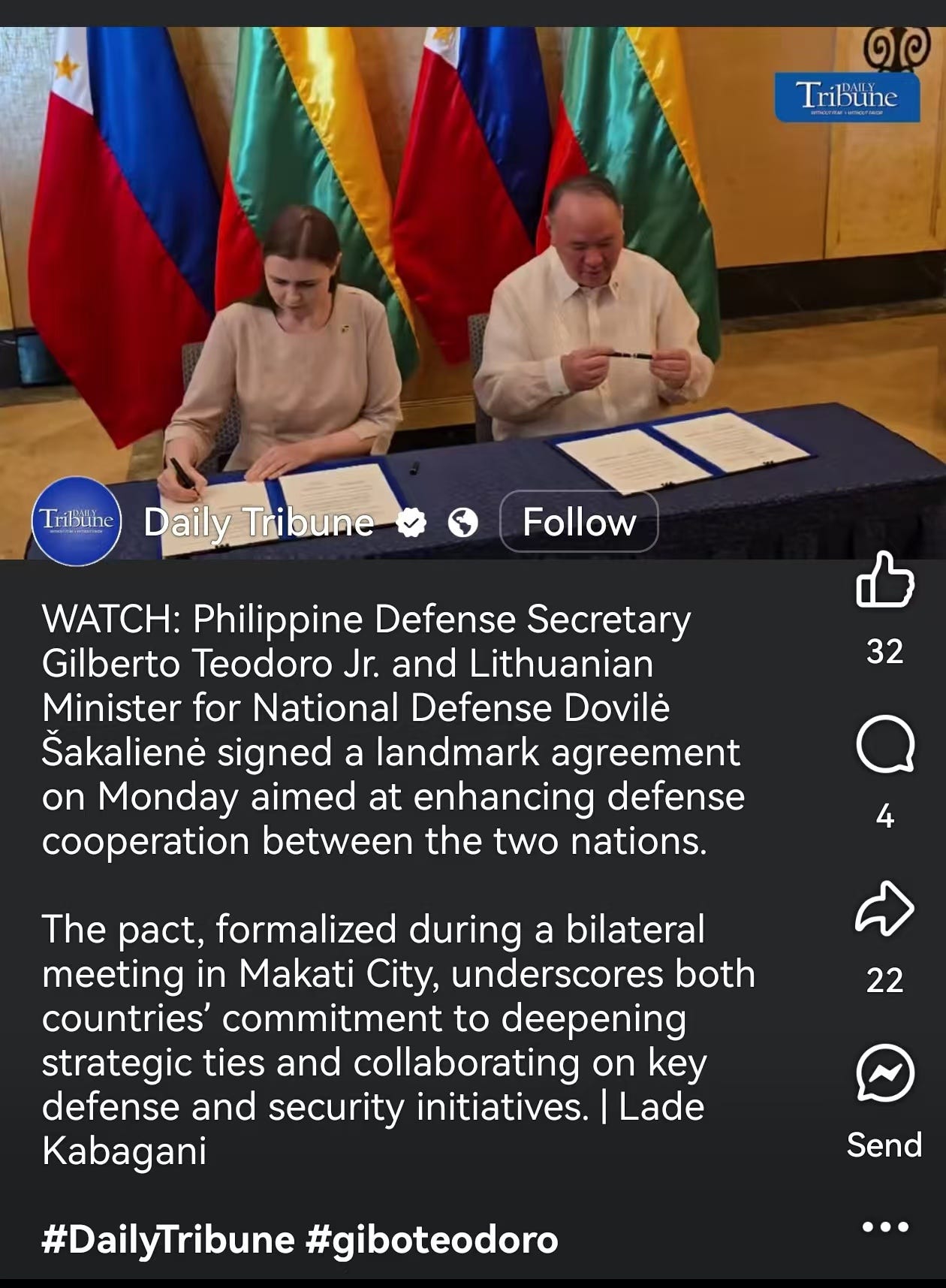Philippine Defense Secretary Gilberto Teodoro Jr. recently revealed that military leaders are working on a unified "one-theatre" operational strategy for the East and South China Seas, citing their similar maritime characteristics and shared security challenges. The plan excludes the Korean Peninsula and aims to enhance real-time coordination, intelligence-sharing, and joint capabilities.
This initiative aligns with the "Squad" coalition, comprising the U.S., Japan, Australia, and the Philippines, which plans to launch a regional coordination center by December. Japan is already advancing its operational command for this purpose.
Under President Ferdinand Marcos Jr., the Philippines has expanded its defense ties beyond its traditional alliance with the U.S., forming new partnerships with Japan, New Zealand, and Lithuania. A memorandum of understanding was recently signed with Lithuania covering cybersecurity, maritime security, and munitions cooperation, amid growing concerns over regional threats and destabilizing tactics by hostile actors.
Reaction:
Hey, Mr. President Marcos Jr., since you wear the crown as the sole architect of our foreign policy and supreme commander of our armed forces, at least according to our Constitution, let’s get something clear: the buck stops with you, Sir. Not with Gibo, your defense secretary. He’s merely your alter ego, though lately he seems to be doing all the talking, marching, and handshaking with foreign generals and the defense secretary as if he were auditioning for a NATO badge.
Let’s talk about this “one-theatre” military strategy that stretches from the East to the South China Seas, stitched together by your newfound “Squad” of best friends, namely, the United States, Japan, and Australia. On the surface, it might look like strategic genius. Dig a little deeper, however, and it reeks of poor judgment, dangerous oversimplification, and outright abandonment of our regional identity and diplomatic and strategic autonomy.
First, ASEAN Centrality Just Left the Room. “Regional solutions to regional problems,” remember that? It’s the mantra of ASEAN, the bloc we claim to be a proud part of and a founding member. But this so-called “one-theatre” approach bulldozes that principle by dragging non-ASEAN powers right into the heart of Southeast Asian maritime disputes. What does this say to our neighbors like Indonesia, Malaysia, or Vietnam? That we’d rather tango with Washington and its Western friends than work within our own neighborhood?
In this regard, Congratulations, Mr. President, you’ve just handed ASEAN member-states a reason to start wondering if Manila even belongs in the same room with them.
Second, You’ve Just Armed the Security Dilemma. By creating a joint command and establishing coordination centers with outside powers in contested waters, the Philippines has essentially thrown gasoline on an already simmering fire. What you call a defensive posture, China will call an encirclement. What you call deterrence, others will see as provocation. Do you see where this is going, Mr. President?
Sir, this is the geopolitical equivalent of bringing a gun to a tense standoff and hoping no one flinches. Spoiler: Someone always flinches.
Third, Kiss Diplomatic Leverage Goodbye. Once upon a time, small and middle powers like the Philippines could play both sides to secure aid, investment, and security assurances during the time of President Rodrigo Duterte, who is now detained in the Hague, for being a good leader for the country, what an irony for the Philippines, really. It was called “strategic autonomy.” But now? We’re no longer an independent player; we’re a U.S. forward-deployed pawn. Are we not Mr. President?
Instead of being a bridge or a balancer, we’re now a bunker, a glorified launchpad for someone else’s fight, -“ the evil empire” as they say. And if war breaks out, guess who gets hit first? Any educated guess, Mr. President?
Fourth, the Constitution? What Constitution? Let’s ask the uncomfortable question: has any of this been debated in Congress, as our laws and Constitution require? Or are we governing foreign military deployments through backdoor diplomacy and media statements? Does the Filipino public have any say, or are we to be treated as clueless spectators to the militarization of our own territory by the United States and its so-called Western friends?
This isn’t just about foreign troops; it’s about foreign strategy running on our soil, and without public consent. That’s NOT leadership; that’s negligence!
Fifth, Asia is Not Europe! Stop Forcing a NATO Narrative! Here’s the thing: Asia is not the Atlantic, and we’re not some post–World War II battleground in need of saving. The ASEAN region is a mosaic of histories, interests, and sovereignties. Trying to install a one-size-fits-all military umbrella across these waters is not only tone-deaf, it’s provocative and unsustainable.
This “Squad” alliance looks less like a shield and more like a spear, aimed squarely at intensifying U.S.-China rivalry in our backyard. A proto-Asian NATO may sound exciting in think tank PowerPoints, but on the ground, it’s a geopolitical gamble that the Philippines may not survive unscathed.
Mr. President, if you genuinely want to protect the Philippines, maybe start with safeguarding our diplomatic sovereignty, strategic autonomy, constitutional processes, and regional credibility, not just securing military toys. This “one-theatre” strategy might win nods in Washington or Tokyo, but it’s a losing script for peace, stability, and Philippine national and self-interest.
The wiser route? Reinforce ASEAN, reclaim our voice, pursue strategic autonomy, and invest in self-reliant defense, not in becoming the poster child of outsourced militarism.
Because if a catastrophe comes, as your position implies, it’s not Gibo’s name on the Constitution. It’s yours, President of the Republic of the Philippines, remember?? Gets, Mr. President??? Goodness!!!







Agree madam, we also have a very weak, incompetent, and drug influenced admin who thinks just for his interest, and not the good of the many.